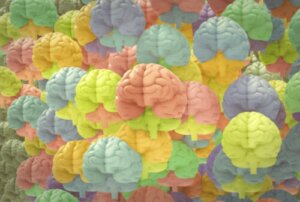Hindsight Bias: It's What You Always Knew Would Happen!

The brain is a complex and fascinating organ. It allows us to reason, interpret situations, and even anticipate the possible results of an event. However, this mental process isn’t infallible. We often make mistakes without even being aware of them. This is what happens with hindsight bias, which makes us think that we knew what was going to happen even before it happened.
We’ve all experienced the effects of this bias. Once we’ve seen the results and outcome of a situation, it seems obvious to us that everything was going to turn out that way.
“I knew I wouldn’t get that job”… “It was clear that the relationship had no future” … “It was obvious who was going to win that game”. In short, everything seems very clear to us later on, but at the time it wasn’t so clear.
What’s hindsight bias?
Hindsight bias is part of the many cognitive biases that we unintentionally employ on a daily basis. These cognitive biases are distortions in the reasoning process that lead us to interpret information in a way that isn’t in line with reality.
We apply them, for example, when we judge a person based on stereotypes or when we follow groupthink, believing that it’s really our opinion.
In this case, hindsight bias leads us to think that we knew exactly how things would pan out. However, we always do this when things have already happened.
In other words, we convince ourselves that we’ve foreseen an event, but after it has already taken place. With hindsight bias, we alter the memories of our past judgments so that they’re compatible with what we know now. It could be said that we’re biased by knowledge acquired with hindsight.

Find out more here: Memory Loss and Forgetfulness: Are They Normal?
Some examples of hindsight bias
In everyday life, we can find many examples of hindsight bias. For example:
- When we find out that a person has been lying to us and we claim that we always knew they weren’t to be trusted.
- If two people split up, we think there were clear signs that their relationship wasn’t going well.
- If we’re accepted into a college, we have the feeling that we always knew it would be so.
- When a patient’s medical diagnosis is discovered, professionals may feel that it was obvious what was wrong with them.
- When analyzing historical events, we consider that what happened was to be expected. This was demonstrated, for example, in an investigation in which two different types of actions of a fictitious historical character were revealed. The participants (whether they were told the person had performed heroic or cowardly actions) considered that it was obvious that the character would act in that way.
Research in this regard
This cognitive bias has been confirmed through many interesting scientific studies showing how it occurs in very diverse situations. For example, in one study, researchers asked a series of volunteers to evaluate the probability of the occurrence of certain events during an international tour of President Richard Nixon.
Some time later, they were asked to estimate the probabilities they thought they had given beforehand.
The results showed that, for events that had actually occurred, the estimates were much higher than they were in the first instance. That is, people overestimated their past ability to predict the future.
In another study, participants were presented with a story of four possible outcomes. Each group was informed that a different outcome had actually occurred and were asked to estimate the probability of occurrence of each scenario. In all cases, the outcome that was considered to be true was assessed as much more likely.
Furthermore, it has been observed that a posteriori, not only do we simplify the analysis, but we’re much harsher and more critical when the outcome is unfavorable. For example, in one study, a group of physicians were asked to review clinical notes. They were identical for all of them, and only differed in the patient’s result (positive in some cases, and negative in others). When the result was negative, the professionals were much more critical.
Read more here: Parts of the Brain and Their Functions
Why does it occur?
There are several related causes and factors that can contribute to hindsight bias:
- The human brain works with patterns and associations of ideas. Thus, when a consequence follows a cause, we link it as a unique pattern that allows us to remember it and foresee similar situations in the future.
- On the other hand, human beings don’t like uncertainty. We need to perceive the world as a predictable and controllable place.
- Once we observe and understand how an event has happened, it seems more likely and predictable. However, prior to obtaining this information, this wasn’t the case.
- Events whose outcome has a negative value are more susceptible to hindsight bias. That is, situations that we categorize as unfortunate seem much more predictable once they have occurred than positive ones.
- When an outcome surprises us greatly, this bias only appears if we manage to find congruence between the information we had at the beginning and the actual outcome. Otherwise, the opposite effect will arise, and we’ll think that there was no way of knowing.

Hindsight bias can affect our decisions
This bias is present in both children and adults and is nothing to do with any type of illness or condition. It’s just a mental shortcut that serves us to gain a greater sense of consistency. However, it can affect us.
For example, by altering the memories of our past judgments, we may believe that we’re more capable of predicting and guessing an outcome than we really are. And this confidence can lead us to make the wrong decisions. So, even though we can’t prevent it from happening, it’s helpful and quite important to know about it and stay alert to it.
All cited sources were thoroughly reviewed by our team to ensure their quality, reliability, currency, and validity. The bibliography of this article was considered reliable and of academic or scientific accuracy.
- Caplan, R. A., Posner, K. L., & Cheney, F. W. (1991). Effect of outcome on physician judgments of appropriateness of care. Jama, 265(15), 1957-1960.
- Fischhoff, B. (2007). An early history of hindsight research. Social cognition, 25(1), 10-13.
- Klein, O., Pierucci, S., Marchal, C., Alarcón-Henríquez, A., & Licata, L. (2010). “It had to happen”: Individual memory biases and collective memory. Revista de Psicología, 28(1), 175-198.
This text is provided for informational purposes only and does not replace consultation with a professional. If in doubt, consult your specialist.









